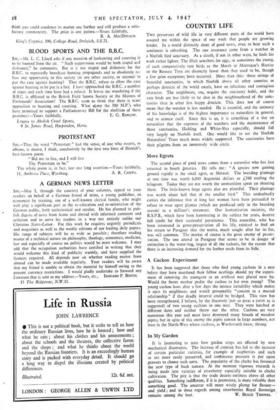COUNTRY LIFE
Two preservers of wild life in very different parts of the world have assured me within the space of one week that people are growing kinder. In a world distinctly short of good news, even to hear such a sentiment is refreshing. The one assurance came from a watcher in a Norfolk bird sanctuary. As a sleuth, if not in other ways, he finds his work rather lighter. The illicit searchers for eggs, or sometimes the young, of such comparatively rare birds as the Marsh or Montague's Harrier or the Roseate Tern are distinctly fewer than they used to be, though a few grim exceptions have occurred. More than this: these strings of beautiful sanctuaries, in which Norfolk above all other counties or perhaps districts of the world excels, have an infectious and contagious character. The neighbours, too, acquire the sanctuary habit, and the rare birds are less likely to be shot in the neighbourhood of the sanc- tuaries than in other less happy districts. This does not of course mean that the watcher is less needed. He Is essential, and the intimacy of his knowledge is of the highest importance to naturalists in general, and to science itself. Since this is so, it is something of a slur on naturalists that the expenses of the watchers and the maintenance of these sanctuaries, Hickling and White-Slea especially, should fall very largely on Norfolk itself. One would like to see the Norfolk Naturalists' Trust much more widely supported. The sanctuaries have their pilgrims from an immensely wide circle.






































 Previous page
Previous page